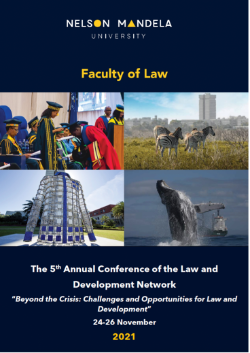SCELG at Law and Development Conference
Nov 2021 — Several SCELG members contributed to the Fifth Annual Conference of the Law and Development Research Network (LDRN) – “Beyond the Crisis: Challenges and Opportunities for Law and Development” was hosted online by Nelson Mandela University Faculty of Law, South Africa, on 24 – 26 November 2021. The Conference’s aim was to explore the meaning, causes and consequences of the gamut of law and development challenges identified, and seek to identify appropriate responses and opportunities from the network of law and development researchers and practitioners.

Overviews of the SCELG presentations delivered at the LDRN conference are as follows:
‘Ocean capture? Ocean management and transformation in South Africa’ by Dr Bernadette Snow (University of Strathclyde, UK), Professor Rosabelle Boswell (Nelson Mandela University, South Africa) and Professor Elisa Morgera (University of Strathclyde, UK) highlighted the discrepancy between, on the one hand, the South African government’s blue economy policy and its ratification of international climate change agreements, and, on the other hand, continued investment in natural resource extraction, including for fossil fuel production. The paper questioned whether South Africa’s ocean is at risk of being ‘captured’ in the same manner as other critical natural assets have been, undermining opportunities for sustainable, inclusive and transformed ocean governance.
‘Ocean capture? Ocean management and transformation in South Africa’ by Dr Bernadette Snow (University of Strathclyde, UK), Professor Rosabelle Boswell (Nelson Mandela University, South Africa) and Professor Elisa Morgera (University of Strathclyde, UK) highlighted the discrepancy between, on the one hand, the South African government’s blue economy policy and its ratification of international climate change agreements, and, on the other hand, continued investment in natural resource extraction, including for fossil fuel production. The paper questioned whether South Africa’s ocean is at risk of being ‘captured’ in the same manner as other critical natural assets have been, undermining opportunities for sustainable, inclusive and transformed ocean governance.
‘Transparency at the International Seabed Authority – matter of international human rights obligations, not just good practice? by Professor Elisa Morgera (University of Strathclyde, UK) and Hannah Lily (Independent Consultant, UK) assessed the current practices, and content and extent of binding international obligations for member States of the International Seabed Authority (ISA) to ensure transparency in its regulatory, management, and monitoring functions. Their paper discussed current approaches to transparency and stakeholder engagement under the ISA against the background of the international law on the protection of the marine environment in the context of the Area. The analysis drew on the importance of the precautionary principle, of ecosystem services for the protection of human rights, and of procedural human rights standards for the common heritage of humankind.
‘The implications of deep seabed mining for the human right to health’ by Graham Hamley (University of Strathclyde, UK) stressed that the potential implications of deep-seabed mining for human health have been largely neglected. He advocated engaging a wider audience in the ongoing negotiations of regulations of deep-seabed mining considering deep-seabed mining as not only an environmental issue, but also a human rights issue, with a view to unlocking of understanding of the state obligations arising from the right to health in the context of the management of the marine environment in areas beyond national jurisdiction.
‘Sea-ing Persons: Personhood, Human Rights, and the Future of the Marine Environment’ by Dr Laura Major and Dr Elaine Webster (University of Strathclyde, UK) stressed the importance of connecting humanity to the ocean in light of the environmental urgency of respecting marine environment. They further noted that to better connect humanity to the ocean, we need to reflect on, and reflect, different ways in which personhood is associated with ocean space. Such reflection is helpful for understanding the capacity of international law narratives to engender respectful relationships between people and the marine environment. They argue that international human rights law has done relatively and uniquely well at ‘sea-ing’ persons, and as part of this paper they began to explore if, and how, the potential of international human rights law might be realised.
‘The need for environmental and socio-cultural impact assessment for large-scale fisheries’ by Associate Professor Daniela Diz (Heriot Watt University), Julia N. Nakamura and Professor Elisa Morgera (University of Strathclyde, UK) aims to clarify the extent to which the international legal requirements for environmental impact assessments and strategic environmental assessments entail the assessments of potential social and cultural impacts from large-scale fisheries and related policies, plans and programmes. They explored the opportunities to interpret relevant obligations under the law of the sea in combination with human rights and biodiversity legal instruments, principles, and approaches, in support of integrated impact assessments for large-scale fisheries, which aim at preventing and/or addressing negative impacts on both the environment and human rights of affected communities.
‘Ocean Science Decade, the One Health approach and the SDGs’ by Claire Lajaunie (Inserm, LPED (Population-Environment-Development Laboratory), France) and Pierre Mazzega (CNRS, LISST (Interdisciplinary Solidarity, Societies, Territories Laboratory), France) shed new light on the gaps between the ongoing One Health scientific research and the goals of the UN Ocean Science Decade. An analysis of the interlinkages between ocean-related concepts and governance-related concepts shows how the implementation of the One Health approach of ocean health may contribute to the improvement of the dialogue between science and policy/law.
Related items
- Learn more about SCELG’s work on oceans.